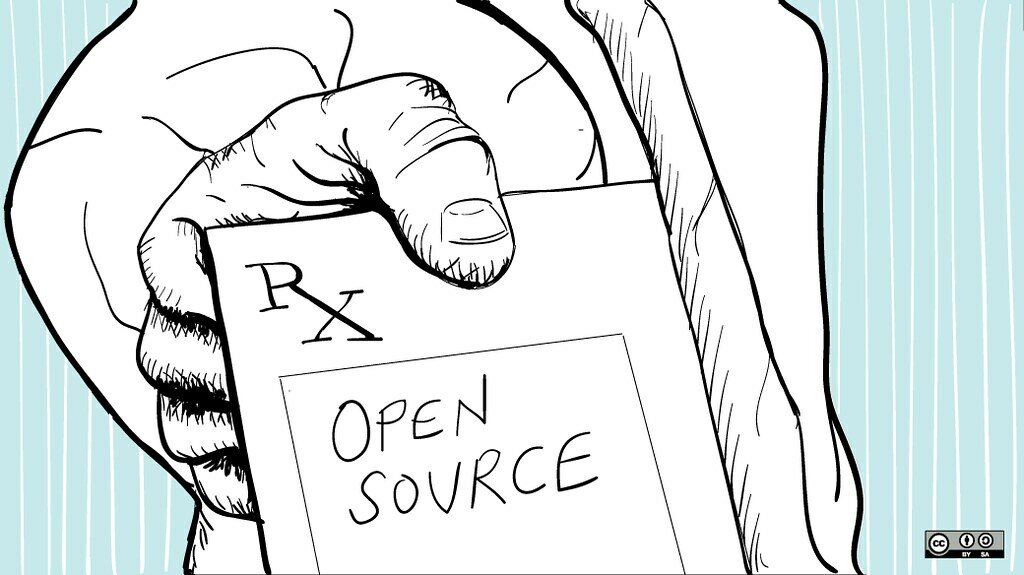(Re)Opening For Business: Reclaiming Digital Sovereignty
by Chris McGivern & Jason Hudson, 1 June 2021

https://flickr.com/photos/opensourceway/7496802140/
The Shuttleworth Foundation subscribes to the spirit of open source software and supports individuals who apply it to new and exciting spheres. We believe open creates the optimal conditions for community, innovation, and sustainable social change. Open is our default, and we require the same from our fellows. As a community, we work openly, think openly and share openly where ethically and feasibly possible. But how open are we in practical terms?
Prompted by Shuttleworth Flash Grant recipient Redon Skikuli, we have been undergoing in-house reappraisal about our digital architecture over the past couple of months. His session at our recent FlashForward event served as a stark reminder of how far we have drifted away from open source and towards a reliance on proprietary tools for our day-to-day operations. Hosting services, documents, email, much more have all fallen into the proprietary rabbit hole.
Redon’s talk took us back to our early days when our philosophical commitment to open was matched by a partisan obstinacy for using and promoting open source tools. We sought open alternatives wherever they existed, even if they didn’t work quite as smoothly. We would return documents back to their sender, proudly announcing that they couldn’t be opened in LibreOffice. Of course, we all used Linux - and still do today. But what about the rest?
In the promo copy for the event, Redon wrote about the decades of hard work involved for open source communities to create amazing collaborative projects, which is something we recognise in the work we do with our fellows. But the following lines were a wake-up call:
“Usually, members of these communities or big organisations are quite vocal about the importance and the value that their software represents. Unfortunately, some of these organizations decide not to have the same approach when it comes to their own digital infrastructure.”
Replace the term ‘software’ with ‘fellows’ or ‘projects’, and we are guilty as charged. Over the years, we have continued to champion open loudly while the functional apparatus of our operations has slowly been replaced by commercial, not communal, tools.
Some environmental factors are involved with this evolution/devolution. When our Director Jason Hudson left the Foundation for a short while, we also lost his technological expertise. He equipped us with proprietary systems that could effectively run themselves and we felt they were an adequate compromise - rather naively, we believed Google and its ‘don’t be evil’ ethos. Since Jason’s return, we have slipped further into the wormhole, telling ourselves the same illusory cover stories that used to make us blanch when others used them: it’s for convenience, it’s the best tool for the job, it’s just easier.
But not anymore. We can’t demand specific requirements from others when we don’t follow them ourselves. As a matter of integrity, if we say we are open, we must be as open as possible. If we want to protect the open web, let’s support its defenders by using their services, not those of the powerful monopolists who actively threaten our freedoms. We must choose small tech over Big Tech; community over corporatism; ethics over ease of use.
We are re-committing to open. Our technology, email, calendars, code and a whole lot more are finding new, collectively built and maintained homes. There will be plenty of challenges during this transition and disentangling ourselves from the clutches of Big Tech will resemble something like an escape room experience, minus the visceral thrills. We may fail to find suitable open alternatives for everything, but if we care about privacy, surveillance, ownership, and equity, it’s crucial that we try.
It is no longer acceptable to relinquish our privacy for convenience. Privacy is not just about keeping the curtains closed and hiding from prying eyes. It’s also about our rights. We want control of our data and the ability to decide how it is used - not for it to be stockpiled, organised, and sold by a few organisations who continue to prove they cannot be trusted; even in an environment with good privacy legislation, such as GDPR.
This centralisation of the web’s information - our information and our knowledge - is posing a myriad of threats to society. No good comes from the monopolisation of power, censorship, and the narrowing of perspectives available to the public, or the way we are tracked, traced, and surveilled with every click of the browser. At best, we have become the product. At worst, surveillance capitalism poses serious security risks to our communities and exacerbates digital inequalities. That makes open source the sensible and ethical choice.
It’s open season at the Shuttleworth Foundation. We are taking real ownership of our digital infrastructure and working with partners who share our values, not corporations motivated by profit. We’re reclaiming our digital sovereignty.
Thanks to Redon Skikuli of Cloud68 and Open Labs for the inspirational FlashForward talk and for reminding us of what we had forgotten.